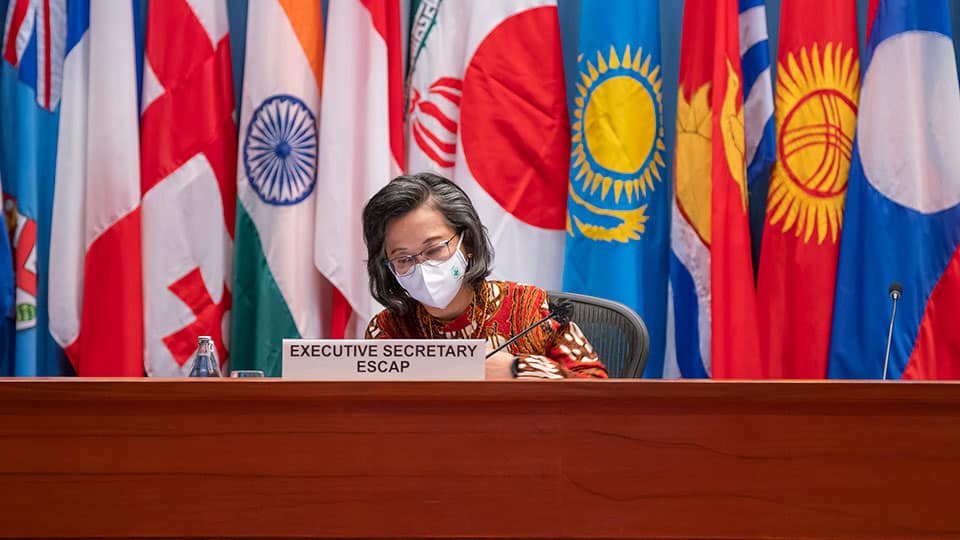Shaping our digital future

Asia and the Pacific is the most digitally divided region of the world, and South-East Asia is the most divided subregion. The Covid-19 pandemic detonated a “digital big bang” that spurred people, governments and businesses to become “digital by default;” a sea change that generated vast digital dividends. These benefits that have not been distributed equally, however. New development gaps have emerged as digital transformation reinforces a vicious cycle of socioeconomic inequalities, within and across countries.
Bridging these divides and ensuring advances in technology can benefit everyone will be a key challenge as the region seeks to achieve a more inclusive and sustainable post-pandemic recovery. A new ESCAP report, Asia-Pacific Digital Transformation Report 2022: Shaping our digital future, identifies five key “digital divides;” fault lines that separate those who can readily take advantage of new technology from those more likely to be left behind. These divides are related to age, gender, education, disability and geography.
Typically, those most comfortable with technological innovation are younger and better educated people who have grown up with the Internet as ”digital natives”. Older persons may be more distrustful, or slower to acquire the necessary skills or suffer declines in aptitude. But at any age, poor communities – especially those in rural areas – are most at risk as they may be unable to afford electricity or digital connections or lack the relevant skills, even if the necessary infrastructure and connectivity are there.
The most significant driver of digital transformation is business research and its development and adoption of frontier technologies. Another major component is e-government; the delivery of public information and services via the Internet or through other digital means. This has the potential for more efficient and inclusive operations; especially when linked to national digital ID systems. However, because e-government services often evolve in complex regulatory environments, providing appropriate levels of accessibility for older generations, the disabled, or those with limited education has become more challenging.
It is clear that digital technologies are enabling the delivery of previously unimagined services while enhancing productivity and optimizing resource use that helped reduce emissions of greenhouse gases and pollutants. These technologies also helped track and contain pandemic spread. Social networks are fostering and diversifying communications among people of all ages sharing common interests, irrespective of location. This helps them stay in touch, broaden their experiences, continue education or deepen subject knowledge. This provided a veritable lifeline that has continued as we enter the post-pandemic era.
At the same time, the risks have also proliferated. Social networks also created social ”echo chambers” and generated torrents of misinformation and hate speech. New cryptocurrencies have opened the way to speculative financial bubbles, while cybercrime increased alarmingly as it assumed prolific variations. In addition, digital gadgets and the Internet are thought to contribute to more than 2 per cent of the global carbon footprint. The manufacture of electronic hardware can also exhaust supplies of natural resources such as rare-earth elements and precious metals like cobalt and lithium.
Moreover, digital transformation has led to the creation of an immense amount of digital data which become an essential resource to understand digital transformation. However, it raises concerns about the ethical and responsible use of data for privacy protection. A common understanding among countries on the operationalization of such principles has yet to evolve.
The Asia-Pacific Digital Transformation Report 2022 highlights the importance of digital connectivity infrastructure as “meta-infrastructure.” 5G and other high-speed networks can make all other infrastructure – such as transport and power grid distribution – much smarter, optimizing resource use for sustainable development. To contribute to these needs, the Report recommends three pathways for action, which are not mutually exclusive and are aligned with the ESCAP Action Plan of the Asia-Pacific Information Superhighway initiative for 2022-2026.
The first pathway focuses on the supply side and provides relevant policy practices for the development of cost-effective network infrastructure. The second addresses the demand side and recommends capacity-building programmes and policies to promote uptake at scale, of new, more affordable and accessible digital products and services. The third involves improving systems and institutions that are related to collecting, aggregating and analysing data in a way that builds public trust and deepens policymakers’ understanding of the drivers of digital transformations.
Finally, in a world where digital data can flash around the globe in an instant, the report highlights the importance of regional and global cooperation. Only by working together can countries ensure that these technological breakthroughs will benefit everyone; their peoples, economies and societies, as well as for the natural environment, in our new “digital by default” normal.
Written by Armida Salsiah Alisjahbana.
Have you read?
These are the countries with the Highest Average Salaries, 2022.
International Financial Centers Ranking, 2022.
Top 3 Mindset Habits for CEOs, Founders, and Executives by Mindset Expert and Coach Jeff Meyer.
Richelieu Dennis on the Differences Between Building a Business vs. a Career.
VeeamON 2022: Veeam Backup & Replication v12 and Other New Products to Expect Soon.
Live Video and Marketing Strategies by Ronn Torossian.
Add CEOWORLD magazine to your Google News feed.
Follow CEOWORLD magazine headlines on: Google News, LinkedIn, Twitter, and Facebook.
Copyright 2024 The CEOWORLD magazine. All rights reserved. This material (and any extract from it) must not be copied, redistributed or placed on any website, without CEOWORLD magazine' prior written consent. For media queries, please contact: info@ceoworld.biz








